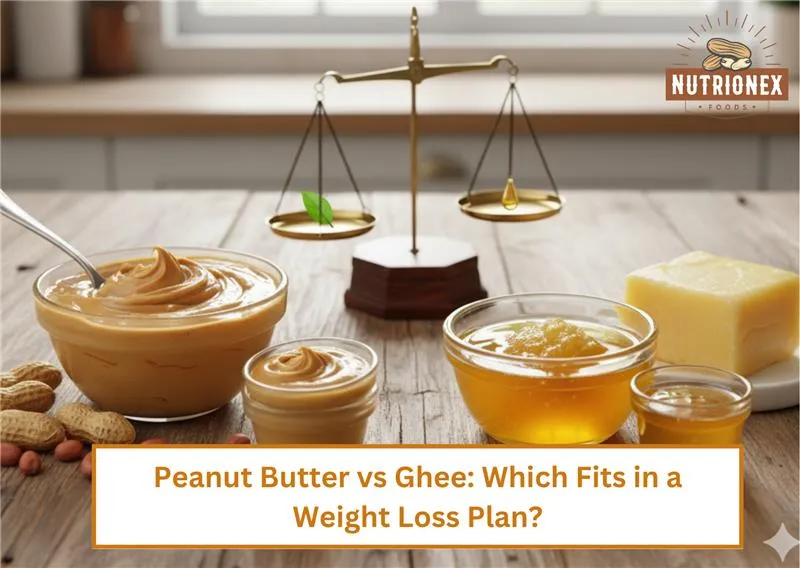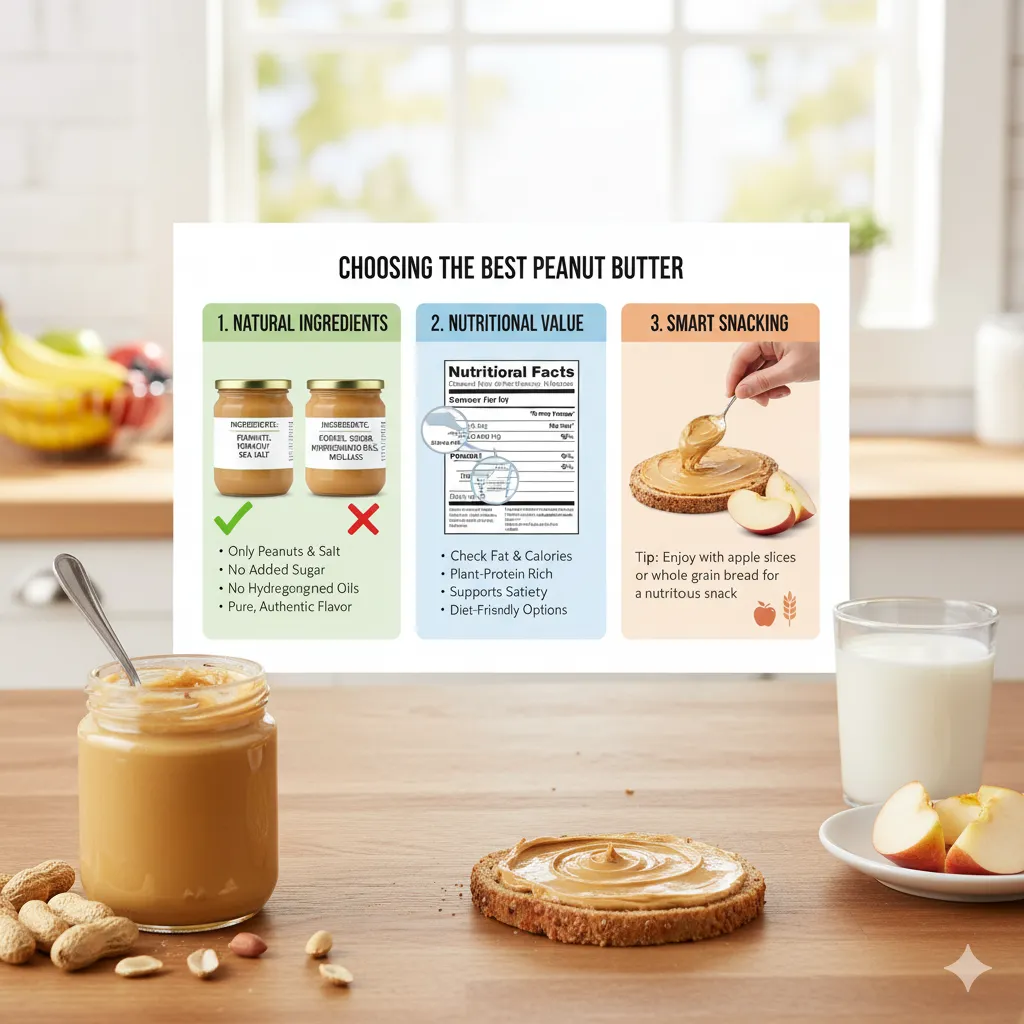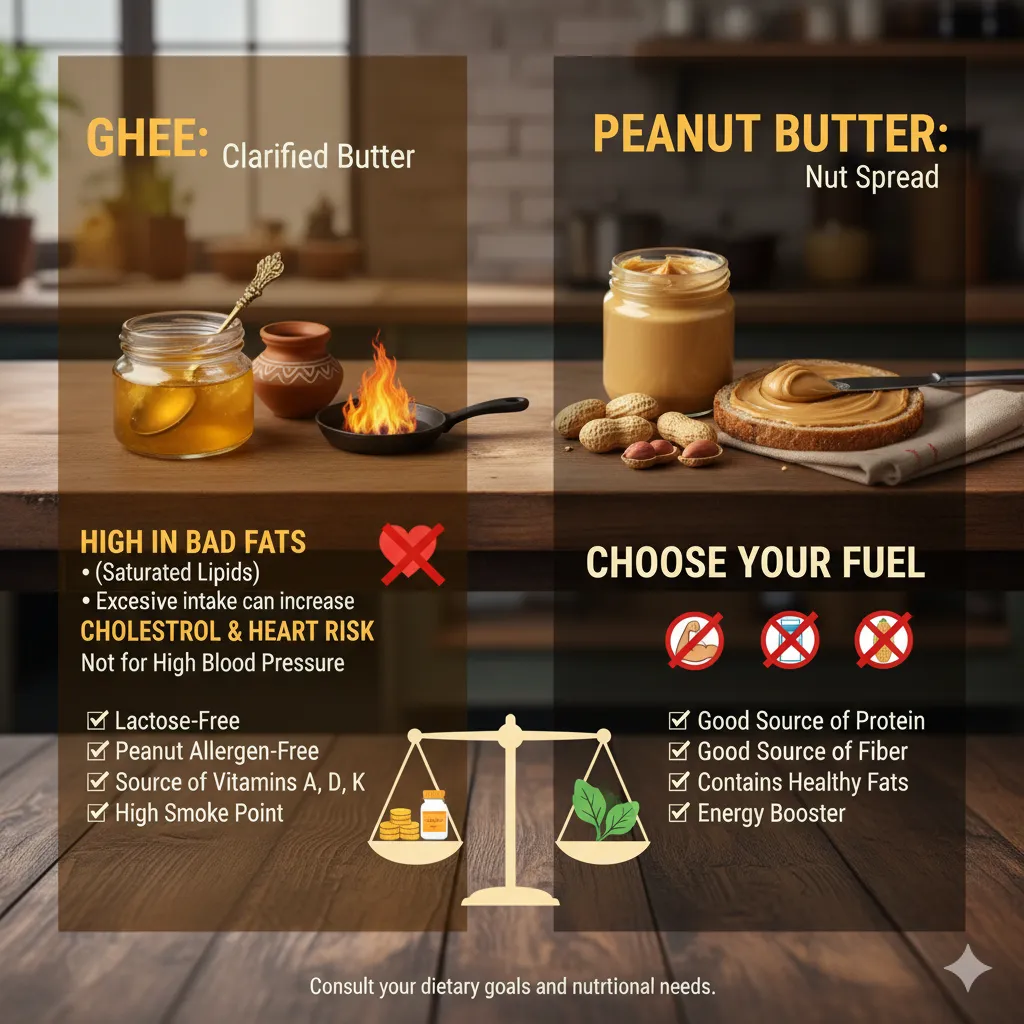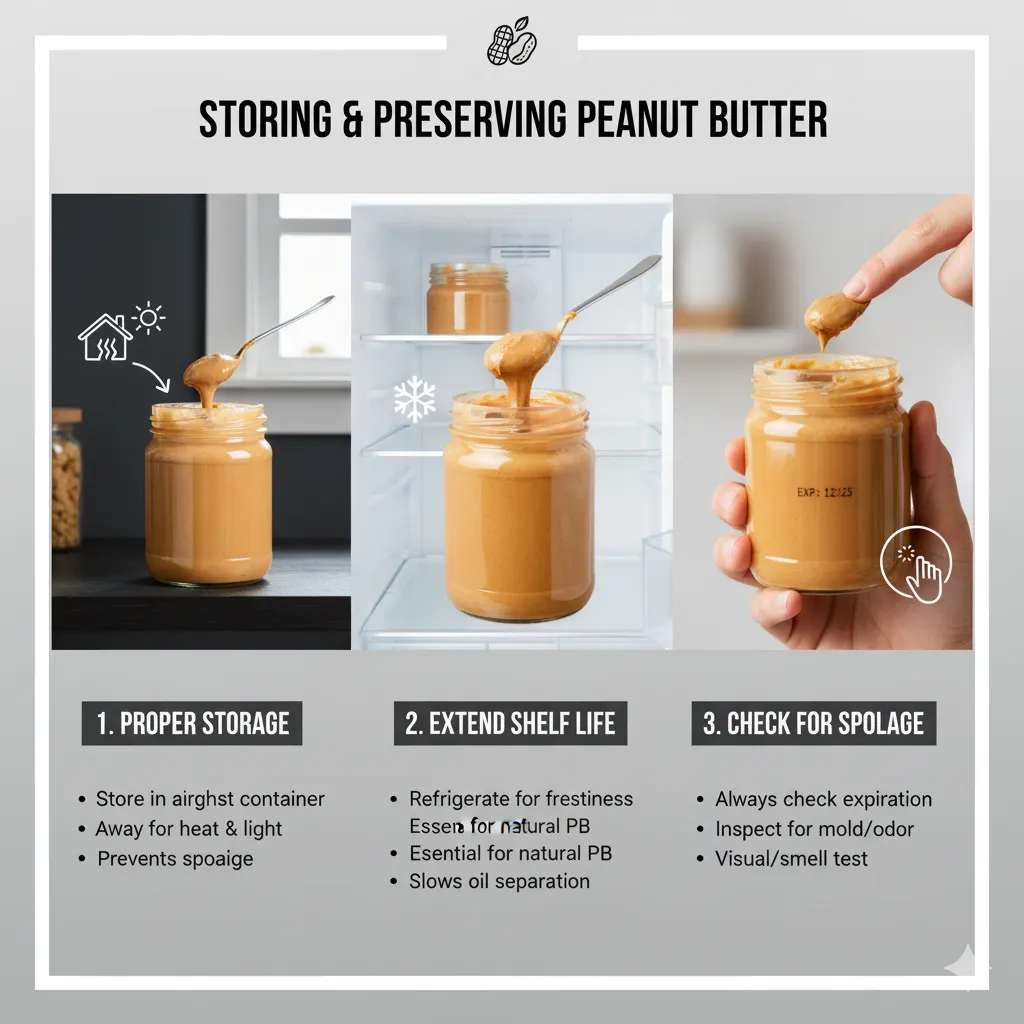
Peanut Butter Vs Ghee: Which Fits In A Weight Loss Plan?
A healthy diet rich in essential vitamins and minerals is crucial for maintaining a healthy weight and reducing the risk of heart disease. Making smart dietary choices, including what you eat such as incorporating nutritious foods like peanut butter can support health and weight management. These choices can help manage cholesterol levels, support weight loss goals, and promote overall Cardiac health. Two popular options for adding fats to your diet are peanut butter and ghee, both offering unique nutritional profiles.
Peanut butter provides essential nutrients such as protein, fiber, and healthy fats. It contains important nutrients like protein, fiber, and fats that contribute to a balanced diet and weight control. Natural peanut butter is often recommended for its minimal processing and lack of added sugars or hydrogenated oils. In fact, peanut butter in its most original form is made from only peanuts, with minimal or no additives. Ghee is a source of saturated fats and fat-soluble vitamins. Understanding the benefits, drawbacks, and appropriate use of each can help you incorporate them wisely into your weight loss diet or healthy eating plan.
What is Healthy Eating
Healthy eating is the foundation of a healthy lifestyle and plays a vital role in losing weight and maintaining overall well-being. A healthy diet focuses on a balanced intake of nutrient-rich foods, including fruits, vegetables, whole grains, lean proteins, and nutritious fats. Incorporating foods like peanut butter, which is a source of nutritious fats, can help you feel satisfied and energized throughout the day. When aiming for weight loss, healthy eating helps reduce excess calorie intake while ensuring your body receives the nutrients it needs to function at its best. By making mindful food choices and prioritizing a variety of wholesome foods, you can support your weight loss journey and achieve lasting results.
Importance of Nutrients
Nutrients are essential for supporting weight loss, maintaining energy, and promoting overall health. Protein helps build and repair muscles, while nutritious fats such as those found in natural peanut butter provide long-lasting energy and support cardiac health. Dietary fiber, abundant in natural peanut butter, aids digestion and helps you feel full, making it easier to stick to your weight loss plan. Essential vitamins, like vitamin E, play a role in protecting your cells and supporting your immune system. By choosing foods rich in these nutrients, you can enhance your weight regulation, boost your Cardiac health, and ensure your diet meets your body’s needs for optimal performance.
Benefits of Peanut Butter
Peanut butter is a nutrient-dense food that offers several health benefits when consumed in moderation. It contains Plant-based fats, which are considered heart healthy fats. These fats can help lower cholesterol levels and reduce the risk of heart disease.
Peanut butter is also rich in essential vitamins like vitamin E, which functions as an antioxidant, and B vitamins that support energy metabolism. As a source of vitamins and minerals such as vitamin E, magnesium, and potassium, peanut butter provides important nutrients in their natural form. Its protein content contributes to satiety, helping reduce hunger and support weight loss efforts. Peanut butter helps with weight loss by promoting fullness, supports cardiovascular health through nutritious fats, and aids in blood sugar regulation due to its fiber and protein. Additionally, the dietary fiber in peanut butter promotes healthy digestion and may help regulate blood sugar levels.
Regular consumption of natural peanut butter has been linked to improved Cardiac health, better weight regulation, and reduced risk of certain chronic diseases. By including peanut butter in a balanced diet, individuals can satisfy their taste buds with its distinct nutty flavor while nourishing their bodies.
Choosing the Best Peanut Butter

When selecting peanut butter, consider brands that use only peanuts and a little salt, avoiding added sugar and hydrogenated oils. Peanut butters in their natural form contain no additives and are made solely from peanuts, highlighting their purity and minimal processing. Natural peanut butter is preferred, as it tends to have fewer additives and retains more nutrients compared to regular peanut butter. In these products, the natural sweetness of peanuts comes through, offering a purer and more authentic flavor.
Check the fat content and calories to ensure it aligns with your diet plan or weight loss program. Options include various peanut butters such as creamy peanut butter for smooth spreads and organic peanut butter for a more natural product. Some brands offer plant-protein-rich peanut butter, making it ideal for those following healthy eating habits or weight loss diets.
Tip: Consuming peanut butter with apple slices or whole grain bread can enhance satiety and provide a nutritious snack.
Peanut Butter and Weight Loss
Despite being calorie-dense, peanut butter can be beneficial for weight loss if consumed in moderation. Eating peanut butter as part of a health-conscious diet can promote fullness, support weight control, and provide various health benefits when appropriate portions are consumed.
Including peanut butter in a fat-burning diet can reduce cravings and help adhere to a weight loss plan. However, eating more calories than you burn, even from healthy foods like peanut butter, can hinder your ability to lose weight. Overconsumption may hinder progress due to its high calorie count and fat content. A balanced diet that incorporates peanut butter, along with fruits, vegetables, and lean proteins, is essential for long-term weight loss success.
Many individuals include peanut butter in intermittent fasting or daily routine plans to stay full between meals without consuming sugary drinks or unhealthy snacks. Peanut butter can be incorporated into various weight loss plans as a nutritious, protein-rich food when eaten in moderation.
Creamy Peanut Butter Options
Creamy peanut butter is widely preferred for its smooth texture and versatility. When choosing a creamy variety, opt for those with minimal ingredients, no sugar, and no hydrogenated oils. Some peanut butters use roasted peanuts, which enhances the depth of flavor and gives a richer, more robust taste profile.
Even within peanut butter brands, the calorie content may vary, so always check nutrition labels. It can be incorporated into diet plans, snacks, or healthy recipes, providing essential vitamins and unsaturated fats while supporting fat loss .
Natural peanut butter options are particularly suitable for weight loss diets, as they avoid sugars and unnecessary saturated fats found in some commercial spreads.
Ghee as a Dietary Option

Ghee, a type of clarified butter, has been used in traditional medicine for centuries and is praised for its potential health benefits. With a higher burning point than regular butter, ghee is ideal for cooking and sautéing without breaking down into harmful compounds.
Ghee contains bad fats, which can increase cholesterol levels and heart disease risk if consumed excessively. Excessive intake of saturated lipids is also associated with a higher risk of developing high blood pressure and heart attack. Individuals with high blood pressure or at risk of heart attack should be especially mindful of their bad fats intake. Unlike peanut butter, it is free from peanut allergens and suitable for those with lactose intolerance.
When choosing between peanut butter and ghee, consider your dietary goals and nutritional needs. Peanut butter provides protein and fiber, whereas ghee is a concentrated source of calories and fat-soluble vitamins like A, D, and K.
Health Considerations
Peanut butter can pose health risks for individuals with allergies or young children due to choking hazards. Always check for sugar, bad fats, and sodium content to ensure it aligns with your dietary needs.
Ghee is generally safe for those with dairy allergies or lactose intolerance, but its saturated fat content requires mindful consumption, especially for individuals aiming to maintain healthy cholesterol levels or prevent heart disease, as well as those focused on weight maintenance.
Physical Activity and Healthy Eating
Combining regular physical activity with healthy eating is key to successful weight loss and long-term health. Physical activity helps burn calories, build muscle, and improve overall fitness, while a balanced diet provides the fuel your body needs to perform at its best. Eating a snack like peanut butter with banana before a workout can supply sustained energy and support muscle function. By pairing healthy eating habits with consistent physical activity, you can maximize your weight loss results, maintain a weight, and enjoy greater overall well-being.
Mental Health and Healthy Eating
A healthy diet not only benefits your body but also supports your mental health. Eating a variety of whole foods such as fruits, vegetables, whole grains, and lean proteins can help reduce the risk of health conditions like depression and anxiety. Limiting added sugars and processed foods is important, as these can negatively impact mood and mental well-being. Practicing healthy eating habits, such as eating regular meals and avoiding restrictive diets, can foster a positive relationship with food and support a healthy body image. By prioritizing nutritious foods and balanced eating, you can enhance both your physical and mental health.
Maintaining a Healthy Weight
Achieving and maintaining a healthy weight involves a combination of healthy eating habits, regular physical activity, and a balanced diet. Including peanut butter in a weight loss program can be effective, but portion control is key.
Incorporating whole foods, such as fruits, vegetables, lean proteins, and whole grains, supports weight loss efforts and overall Cardiac health. Regular exercise, including walking, jogging, or strength training, can further enhance fat loss and weight control.
Storing and Preserving Peanut Butter

Proper storage ensures peanut butter maintains its nutritional value and freshness. Store it in an airtight container, away from heat and light, to prevent spoilage and oil separation. Refrigeration can extend shelf life, especially for natural peanut butter without preservatives. Always check the expiration date and inspect for signs of spoilage before consumption.
The Role of Diet in Fat Loss
A healthy diet is essential for fat loss as it provides the necessary nutrients and energy for bodily functions. Including protein, nutritious fats, and complex carbohydrates in meals supports weight management and healthy eating habits.
Avoiding sugary drinks, more sugars, and excessive bad fats can help reduce calorie intake and promote fat loss. Coupling a balanced diet with exercise enhances weight loss efforts and overall wellness.
Common Challenges in Healthy Eating
Many people face obstacles when trying to maintain a balanced diet, from busy schedules to confusing nutrition advice. Limited access to healthy foods and emotional eating can also make it difficult to stick to healthy eating habits. To overcome these challenges, try practical healthy eating tips like meal planning, preparing food at home, and choosing nutrient-dense options such as natural peanut butter. Being mindful of portion sizes and seeking guidance from a registered dietitian can also help you stay on track. By making small, sustainable changes and focusing on wholesome foods, you can build healthy eating habits that support your long-term health and well-being.
Mindful Eating
Mindful eating encourages paying attention to hunger and fullness cues, eating slowly, and savoring food. Practicing mindful eating can prevent overeating and promote weight loss success.
Consuming natural peanut butter as part of a mindful eating strategy can enhance satiety and satisfaction. Regular mindfulness practices, like meditation or deep breathing, also help reduce stress and improve overall health.
Healthy Eating Habits
Developing healthy eating habits is key to supporting weight goals. Eating regular meals, avoiding unhealthy snacks, and incorporating whole foods such as fruits, vegetables, whole grains, and lean proteins provide essential vitamins and nutrients.
Reducing intake of sugars, saturated lipids, and sugary drinks helps control calories and maintain healthy cholesterol. These habits, maintained long-term, promote weight loss, fat loss, and overall health.
Dietary Choices for Better Health
Making informed dietary choices significantly impacts overall well-being. A balanced diet with a variety of whole foods ensures intake of essential nutrients and supports weight management.
Choosing peanut butter over ghee may benefit those seeking protein, fiber, and Polyunsaturated fats and Monounsaturated fats, while ghee may be suitable for cooking and fat-soluble vitamin intake.
Individual Dietary needs and health conditions should guide decisions for weight loss programs or healthy diets.
The Benefits of Healthy Fats
Healthy fats, such as those in peanut butter, are essential for maintaining heart health, controlling cholesterol levels, and promoting satiety. Unsaturated fats support weight loss plans and improve overall health.
Including sources of nutritious fats, like nuts, seeds, avocados, and peanut butter, in your daily routine helps balance calories, support weight management, and provide long-term health benefits.
Conclusion
In conclusion, peanut butter can be a valuable addition to a weight loss diet or healthy eating plan, provided it is consumed in moderation. Choosing natural peanut butter with minimal ingredients and no sugars orSaturated fats ensures maximum nutritional benefits. Ghee can be incorporated for cooking or as a source of fat-soluble vitamins, but excessive consumption may increase saturated fat intake and impact cholesterol levels.
By making informed choices, practicing mindful eating, and developing sustainable healthy eating habits, individuals can support weight loss efforts, maintain a healthy weight, and improve overall well-being.
At Nutrionex Foods, our peanut butter is crafted to retain its natural goodness, making it an ideal companion for your weight loss journey. Incorporating our peanut butter into balanced meals or snacks can help you enjoy flavor, nutrition, and satisfaction without compromising your goals. Remember, portion control is key, and with the right approach, peanut butter can be both delicious and weight-loss friendly.
FAQs
1. Can I eat natural peanut butter daily?
Yes, eating natural peanut butter in moderation provides nutritious fats and protein.
2. How does peanut butter help with weight loss goals?
Peanut butter can keep you full longer, supporting your weight efforts when eaten in controlled portions.
3. Is peanut butter a natural source of protein?
Yes, peanut butter is a natural source of plant-based protein and essential nutrients.
4. Can I include peanut butter in a low-salt diet?
Yes, choosing peanut butter with little salt helps maintain heart health and healthy blood pressure.
5. Can peanut butter be used in food processor recipes?
Yes, you can use it in smoothies, sauces, and homemade spreads.
6. Is peanut butter a good source of plant-based protein?
Yes, it is a good source for vegetarians and vegans.
7. Does natural peanut butter retain most nutrients in their original form?
Yes, natural peanut butter keeps most nutrients without sugar or oils.
8. Does peanut butter have a higher smoke point than ghee?
No, ghee generally has a higher smoke point, better for high-heat cooking.
9. Can peanut butter maintain protein content in a diet plan?
Yes, including it in your diet adds to your daily protein intake.
10. Is peanut butter good for nutritional needs during intermittent fasting?
Yes, it can provide calories and nutrients to maintain energy levels.
11. Can including peanut butter support long-term weight ?
Yes, when eaten in moderation as part of a Balanced diet.
